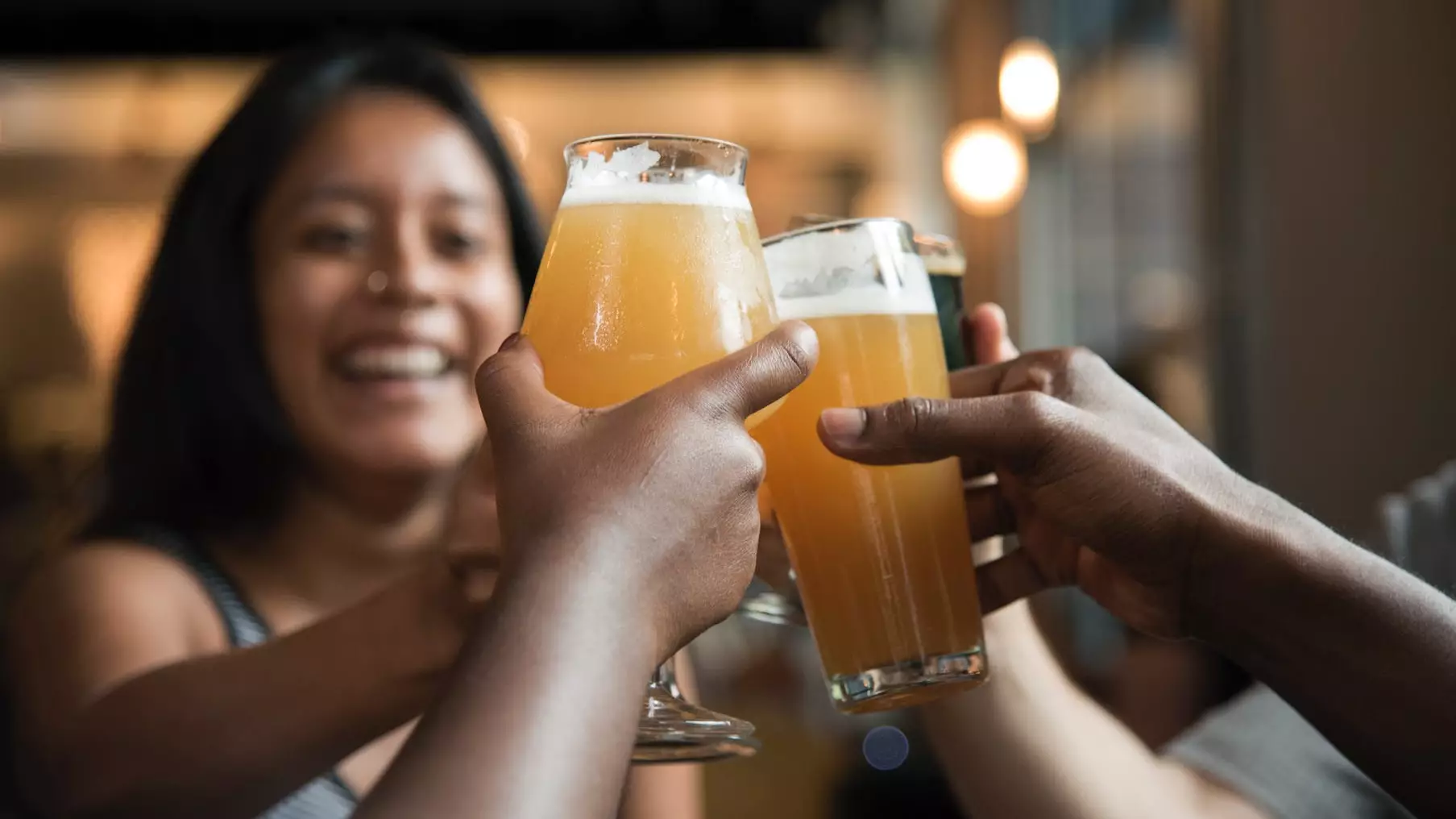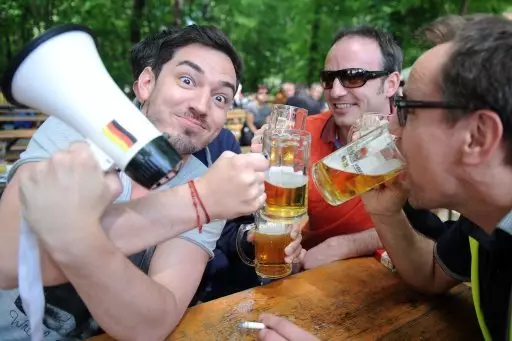
New Year' Eve is often billed as the biggest night out of the year.
But trying to get everyone together for it can be a right pain in the arse, and often the night turns out to be a costly flop. Like the Millenium Dome, Venom or Ángel Di María.
No doubt many of you had more enjoyable nights out during the shitty weeks of January that followed. Indeed, it's often the completely unplanned get-togethers which are the most enjoyable. You know, those ones where you weren't even supposed to be going out, and you end up 'out out'.
Advert
You probably assumed it is the spontaneity of such piss-ups which makes them so enjoyable, but apparently, it's more about the disruption of routine they represent.
That's the theory of Dr Ben Fincham, senior sociology lecturer at the University of Sussex and author of The Sociology of Fun - so yeah, he should know.
Speaking to LADbible, he said: "What I've found is that spontaneity is important because of its disruption to routine. So, what tends to happen with fun is it doesn't happen in relation to routine expectations.
"So if you bump into a mate and you're on your way to buy a kettle, which is boring, and the next thing you know you're in the pub and you bump into some other mates, your expectation of the routine is disrupted. And that then creates the possibility for having a really nice time."
Advert

Dr Fincham (or Dr Funcham, as I like to call him) said spontaneity alone is often falsely assumed to guarantee a good laugh, when in reality the company you keep is more important.
He said: "There is nothing predetermined about the fun you're going to have.
"So, you might end up at home, having had an alright time, but having had a terrible row with a friend in that piss-up - and you still have no kettle. You'll think it was a total waste of time.
Advert
"The spontaneity is a bit of a smokescreen. We often imagine that spontaneity is something that's going to make the experience, but actually it's a whole load of other things. It's often the people you're with.
"If you spontaneously go out with a bunch of people you don't really like, or you feel ambivalent about, it might not be that much fun.
"But if you go on an unplanned piss-up with a bunch of people you absolutely love and you have a roaring time, then that kind of gives credibility to the experience always being fun."
Well that seems a fair assessment. I definitely regret the time I went on an off-the-cuff tear-up down Tiger Tiger with the Made In Chelsea boys.
Advert
Dr Fincham said events, such as festivals and New Year's Eve, demonstrate routine disruption is more important than spontaneity when it comes to fun.
"If you think about a festival, you know exactly the dates when that's going to happen," he said.
"It's hardly spontaneous, because you book your tickets months in advance. But actually, what's fun about them is the disruption from the routine.
"New Year's Eve is a part of routine though. You know it's coming, you have expectations of it and they're often not fulfilled.
Advert
"That said, if you do New Year's Eve differently - say, you and your mates decide it's always rubbish in town, so you get a train to the coast and light a big bonfire instead, you'll have a brilliant time.
"Because it confounds those expectations. You're not paying 15 quid to go into a pub that you normally go in for free."
But what about those weekly things we look forward to, like going to the ballet, equestrian events or - if we're feeling fancy - the football? Aren't they examples of fun derived from routine?

Dr Fincham explained: "Let's say you've got a season ticket, and you go week-in, week-out. On a grander scale, you'd think that's a routine that happens - you go every week. And those of us who do that kind of lazily suggest that it's fun going to the football.
"But I wouldn't describe it as fun; it's often a labour of love. Actually, the fun comes with all the stuff that goes around it: who I'm going with, whether we actually do better against Arsenal than I'm anticipating, whether everyone is in a good mood along the road, what I do afterwards, whether my kids have enjoyed it.
"The football is just a setting for these other things which become fun. So, it looks like it's a routine, but the thing that's fun about football is the minor disruptions that I have from the miserable expectations I have of an afternoon watching Albion get tonked.
"A really miserable afternoon at the football is one of the most miserable afternoons you'll have. Football in and of itself isn't that much fun, it's the arena into which we pour these experiences."
Similarly, the unexpected booze-up with pals represents the perfect synergy of all the factors needed for fun times.
Dr Fincham said: "The spontaneous piss-up with your mates is one of the best times you'll have. When you just go, 'You know what, fuck it, we're going out.' And that's because you've suspended your worries or your cares - 'I'm not gonna attend to those things that I'm supposed to, I'm going to forget them' - that's the first thing. You can't really have fun when you're worried about all your cares in the world.
"The second thing is, it disrupts the routine. You're not expecting it and it happens, and that seems to be an important part of fun.
"The third thing is, it's social. It is had with other people. People say you can have fun by yourself, that's true to an extent, but it's normally with reference to another, like a memory or someone you know you're going to tell, or you're going to class something as fun in retrospect.
"With the piss-up with your mates, and if you go to a club afterwards, you really know you're having fun in that moment. Because all those other attendant features, which go to making an experience fun, are present."
But like spontaneity, booze too is a smokescreen, according to Dr Funcham (sorry, Fincham). Like spontaneity, it may seem never too far away during fun times, but this doesn't mean it is the cause of the fun.
He said: "One of the biggest smokescreens in the UK for generations has been alcohol. Now I'm not being preachy about this, I'm not making a value judgement about how people get their kicks - drugs or alcohol, it's up to them.
"But what alcohol does [is] it dis-inhibits. Often, people mention dancing with other people as when they had loads and loads of fun. Now, without alcohol, it's really difficult for lots of young people to just let themselves go. So what we do is use alcohol as a mechanism, a reason for why you're dis-inhibited. Then you can behave in ways which are much more spontaneous or free or liberal.
"Sometimes, for example, you might drink less because you know you've got work in the morning, but you'll find yourself dancing later on, because you're doing the thing that allows you to and gives you permission.
"But actually, it's not the alcohol that's enabling that. It's the lack of inhibition."
Obviously, we want every get together with pals to be the dog's knees or the bee's bollocks, but we can't exactly start planning unplanned piss-ups. So, how can we utilise all this info to ensure fun times lie ahead?
Dr Funch...Fincham, said: "The big lesson from the spontaneous piss-up is the disruption from the routine, it's had with other people, and it tends to be less inhibited.
"In order to have more fun, we need to learn from the ways in which we feel less inhibited. That doesn't mean disinhibited, that doesn't mean just being stupid for the sake of it, it means dropping your inhibitions in those moment when you think, 'I'd really love to do that, but I'd feel ashamed, I'd feel guilty, I'd feel stupid.'"
But while we all want to have a super fun time, we shouldn't chalk off inhibitions as nothing other than bastard pleasure barriers; some inhibitions are there with very good reason.
Dr Fincham said: "If they're not moral, if they're do to with social stigma or embarrassment, then try and lose them. Be more playful.
"Just be aware where the inhibitions you have for accessing types of experience come from. If they're moral, then probably obey them. Keep those inhibitions there."
Wise words indeed - although please remember that 'but Dr Fincham and LADbible said I'd have more fun without any inhibitions' will definitely not stand up in court.
Featured Image Credit: PexelsTopics: Interesting, Alcohol